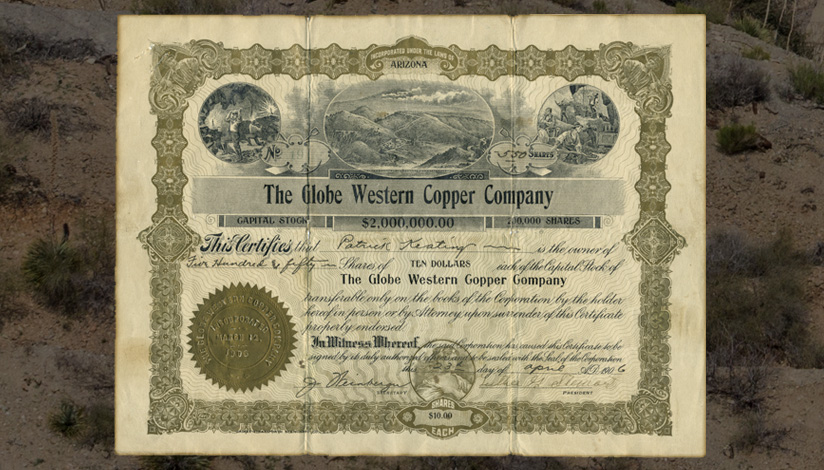
COPPER AND CONSTITUTION
Hidden away in the high, scrubby hills west of Globe-Miami are all that remains of a mining company that played a significant role in the founding of the state of Arizona. That company was the Globe Western Copper Company. Founded in 1906 by partners Clarence Jerome Clark and Luther J. Stewart, the company quickly acquired a string of claims in the Mineral Creek area, most notably the Westbrook and Robertson, and the Cole & Goodwin mines. Although today largely forgotten in the industrial history of the area, overshadowed by more successful mines, such as the Old Dominion and Inspiration, the company nonethless had its own special claim to fame. Jacob “Jake” Weinberger, a young Globe lawyer, was the legal representative and official secretary of the Globe Western Copper Company. He would also become one of the delegates at the Arizona Constitutional Convention of 1910.
Born in 1882 in what was then Austria-Hungary, Weinberger emigrated to the US as a child with his parents and went on to receive a law degree from the University of Colorado. In 1904, he moved to Globe and became partner in a law practice with old classmate Fred Jeremiah Elliott. In 1907, he married Blanche Ruth Solomon, the daughter of Isadore Elkan Solomon, who founded the settlement of Solomonville near Safford. The couple set-up home at 593 E Cedar in Globe. Such was Weinberger’s skill and ambition, that he was appointed as the assistant district attorney of Gila County that same year. By then, he could list among his friends George W. P. Hunt, who would preside over the 1910 convention and later serve many terms as Arizona’s governor. Weinberger’s local ties — both business and social, positioned him to run for and win one of Gila County’s delegation slots to the constitutional convention; he was elected on September 12, 1910.
At age twenty-eight, Weinberger was among the convention’s younger delegates. When the fifty-two delegates convened in Phoenix on October 19, 1910, he served on multiple important committees.
The 1910 convention was a lively collision of populist, progressive and business interests. One of its most controversial initiatives was the populist impulse — strong in Arizona at the time — to make public officials more directly accountable to voters. That impulse produced the highly contentious judicial-recall provision; Weinberger famously argued that delegates had been sent to write a constitution, not to defer controversial questions back to the voters. His insistence that the convention’s work be placed directly in the constitutional text (rather than merely proposing a referendum) placed him firmly on the side of delegates who wanted structural, immediate reforms enacted in the state’s founding document. He was also intimately involved in the textual work and became one of the convention’s active drafters.
The convention’s positions — including recall of judges and other populist measures — put the framers into a national spotlight. President William Howard Taft was critical of parts of the draft constitution (the judicial-recall feature was particularly sensitive) and political disputes followed. Despite national resistance, Arizona’s voters approved the constitution and, after political contest and negotiation, Arizona entered the Union as a state in 1912. Weinberger’s fingerprints, as one of the working drafters and committee members, are part of that story.
Weinberger’s simultaneous presence in Globe’s legal and corporate world and at the center of the constitutional drafting table is a good example of how early-20th-century state building happened at the intersection of business, law and politics. The story of Weinberger’s involvement with the Globe Western Copper Company illustrates how he was handling the types of legal and financial matters typical for a town lawyer who also functioned as a corporate agent or secretary for local enterprises. Those duties would have placed him in regular contact with the mining community whose economic fortunes were bound up with the new state’s legal framework for property, corporations and mineral rights — matters the convention addressed both directly and indirectly. In short: Weinberger’s work for Globe Western and his constitutional role were complementary, not separate, threads of a single civic life.
Weinberger left Arizona in 1911 and moved to California, where he had a long legal and judicial career — culminating in appointment to the U.S. District Court for the Southern District of California in 1946. But his early years in Globe, and in particular his role in the founding of the state, remained a defining chapter.
The Globe Western Copper Company was one of many mining enterprises that made Globe-Miami an engine of economic activity in early Arizona. Jacob Weinberger’s footprint in the town, in particular his involvement with the Globe Western Copper Company and his energetic role at the 1910 Constitutional Convention, illustrate how local business lawyers could become national actors in the process of state formation. Weinberger’s story is a reminder that the drafting of constitutions is not only a matter of abstract political theory: it is also the product of particular people who moved routinely between courtrooms, corporate offices and convention halls, and who carried with them the interests and experiences of places like Globe and Miami into the founding text of a state.
